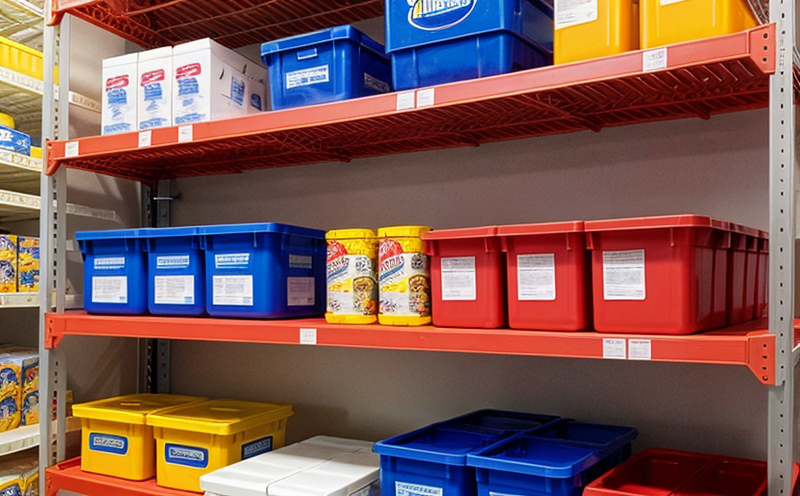ISO 19648 Oxidative Stability Profiling in Edible Oils
The oxidative stability of edible oils is a critical factor that influences their shelf life, sensory properties, and overall quality. ISO 19648 provides a standardized approach to measuring the oxidative stability of vegetable oils by assessing the rate of peroxidation during storage.
During this test, samples are exposed to controlled oxygen levels under specific temperature conditions over time. The method quantifies the formation of hydroperoxides, which serve as indicators of lipid oxidation. This profiling helps in understanding how different factors such as packaging materials, storage temperatures, and exposure to light affect the shelf life of edible oils.
The test is particularly relevant for manufacturers looking to ensure product quality and compliance with food safety standards. By providing a detailed profile of oxidative stability, this service aids in optimizing production processes and extending the shelf life of edible oils without compromising on taste or nutritional value.
Our laboratory adheres strictly to ISO 19648 guidelines to ensure accurate and reproducible results. The testing process involves rigorous sample preparation, precise measurement techniques, and stringent quality control measures at every step. This ensures that the data obtained is reliable and can be used for informed decision-making.
For our clients, this service offers several benefits including improved product quality assurance, enhanced shelf life prediction, and better compliance with international standards like ISO 19648. By understanding the oxidative stability profile of their products early in the development stage, manufacturers can make necessary adjustments to formulations or packaging to enhance performance.
Moreover, this testing is instrumental for R&D teams who aim to innovate new formulations that extend shelf life while maintaining desirable sensory attributes. The insights gained from these tests are invaluable for both existing product line enhancements and developing entirely new products.
In summary, ISO 19648 oxidative stability profiling in edible oils plays a pivotal role in ensuring the highest standards of food safety and quality. It enables businesses to maintain their competitive edge by delivering consistently high-quality products that meet regulatory requirements globally.
Scope and Methodology
The scope of ISO 19648 oxidative stability profiling includes the analysis of vegetable oils to determine their resistance to oxidation under controlled conditions. The test involves exposing samples to oxygen at specified temperatures over time, monitoring the formation of peroxides through specific analytical techniques.
- Sample preparation: Edible oil samples are prepared according to ISO 19648 specifications, ensuring they represent typical market products.
- Oxygen exposure: Samples are exposed to oxygen at defined concentrations and temperatures relevant to expected storage conditions.
- Data collection: Formation of peroxides is measured periodically using spectrophotometric methods.
- Reporting: Results are compiled into a comprehensive report detailing the rate of oxidation, along with recommendations for improving shelf life.
The methodology ensures that each test follows international standards precisely, providing consistent and reliable data. This approach is crucial for maintaining product quality and ensuring compliance with regulatory frameworks worldwide.
Eurolab Advantages
At Eurolab, we pride ourselves on offering unparalleled expertise in food safety testing. Our team of experienced professionals ensures that every test conducted is not only accurate but also efficient and cost-effective.
- Comprehensive Testing Capabilities: We provide a wide range of tests tailored to various sectors, including food & feed industries.
- State-of-the-Art Facilities: Our laboratory is equipped with cutting-edge equipment and software that meet the highest industry standards.
- Regulatory Compliance: We stay updated with all relevant regulations to ensure compliance in every test conducted.
- Client Satisfaction: Your success is our priority. We work closely with clients to understand their needs and deliver results that meet or exceed expectations.
Competitive Advantage and Market Impact
The ability to accurately profile the oxidative stability of edible oils offers significant competitive advantages. By understanding the exact rate at which oxidation occurs, manufacturers can develop strategies to enhance product quality and extend shelf life.
- Innovation: Insights from these tests drive innovation in formulation and packaging design.
- Quality Assurance: Ensuring consistent product quality helps build customer trust and loyalty.
- Regulatory Compliance: Demonstrating adherence to international standards can differentiate products on the market.
- Pricing Strategy: Understanding shelf life allows for more strategic pricing, potentially leading to higher margins.
In terms of market impact, this service contributes to maintaining high standards across the industry. It supports the development of safer and longer-lasting products, ultimately benefiting consumers by providing them with better quality food options.





